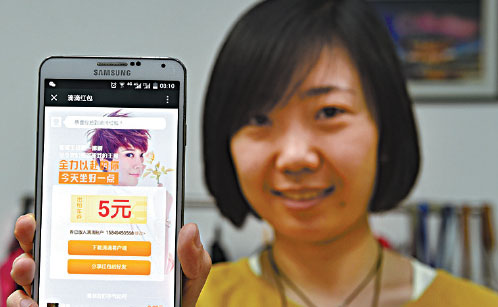Strikes put focus on driver services
By Zhang Yi (China Daily) Updated: 2015-01-16 07:12Car-hailing apps cause country to debate taxi monopoly, passengers' choices and convenience
|
A coupon worth 5 yuan (80 cents) from Didi Dache is shown by a resident of Shenyang, Liaoning province. Such coupons can be used to pay when using the service. Li Gang / Xinhua |
Simply text a few commands on your smartphone, and a top-of-the-range car arrives within minutes to take you to your destination. But the services provided by private car drivers through car-hailing apps are facing a clampdown after large-scale taxi strikes across the country.
The strikes have put under the spotlight calls for a crackdown on the monopoly of taxi firms to provide such services, as well as a discussion on whether passengers should have more choices, including hiring private cars through apps.
The strikes started in Shenyang, capital of Liaoning province, on Jan 4, and have spread to cities including Nanjing, Jiangsu; Chengdu, Sichuan; Changchun, Jilin; Jinan, Shandong; and Nanchang, Jiangxi.
Thousands of cabbies have expressed frustration over reduced income and intensified competition as a result of apps including Didi Dache, Kuaidi Dache and Uber, which allow anyone with a car, but without needing a taxi license, to carry passengers for a fee.
Under current regulations, private car drivers or vehicles without taxi licenses cannot take passengers for profit. Taxi drivers are required to rent authorized taxis from licensed companies and pay rental fees that are often criticized as exorbitant.
Since the car-hailing apps were introduced in September 2012, many Chinese have questioned the system of franchising taxis.
Monthly taxi rental fees are between 7,000 yuan ($1,100) and 9,000 yuan in Nanjing, where strikes continued for several days.
"I handed in more than half of my monthly earnings for the rental fees, but now private car drivers can run a taxi business without paying any money," said Liu Mou, a taxi driver who took part in the Nanjing strike.
"It is unfair that I pay a considerable amount for the right to drive a taxi, while a private car owner is allowed to have the same right for zero cost," he added.
A 44-year-old private car driver caught running a taxi in Beijing admitted that he made a net profit of about 25,000 yuan last month. His profit was more than double that of a licensed taxi driver because he had no rental fees or taxes to pay.
Operators of illegal taxis can be fined up to 20,000 yuan, but drivers have little fear of the penalties because the business is lucrative and they cannot be easily detected.
With sufficient funds from investment companies, the app developers are spending money on sending coupons to passengers and private car drivers. This has posed a threat to taxi drivers who are charged high rental fees but provided with low-quality cars.
At the moment, there are two main players in the country's car-calling market: Didi Dache backed by Alibaba and Kuaidi Dache backed by Tencent. The two companies account for almost 99 percent of the market, with 154 million registered users in more than 300 Chinese cities in the third quarter of last year.
The Transport Ministry recently ordered all taxi-booking apps to stop allowing private car drivers or vehicles to offer taxi services.
While, for the moment, those in the mainstream taxi industry may be relishing the fact that the transport authority has sided with them, few believe that it has delivered a knockout blow to their rivals.
- Govt encourages people to work 4.5 days a week
- Action to be taken as HIV cases among students rise
- Debate grows over reproductive rights
- Country's first bishop ordained in 3 years
- China builds Tibetan Buddhism academy in Chengdu
- Authorities require reporting of HIV infections at schools
- Typhoon Soudelor kills 14 in East China
- Police crack down on overseas gambling site
- Debate over death penalty for child traffickers goes on
- Beijing to tighten mail security for war anniversary








